therapy
Latest
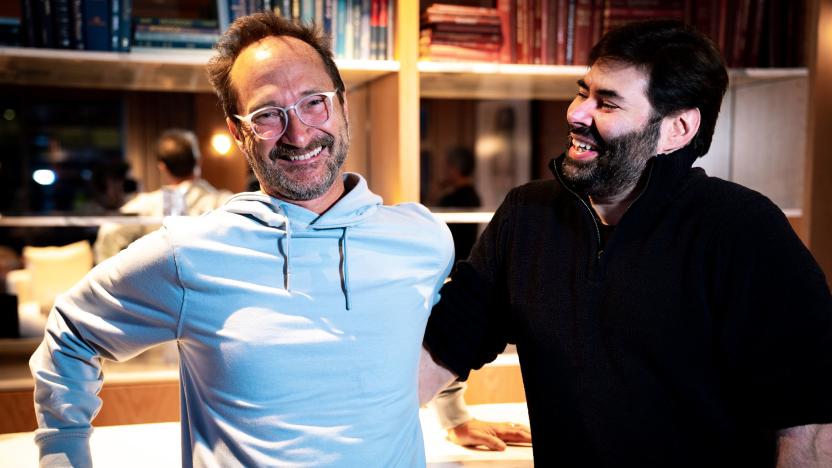
DeepWell DTx is a therapy-focused game studio from the co-founder of Devolver
More than 40 developers and medical experts are part of Mike Wilson's new project.

Playing psychotherapist to a troubled AI in 'Syntherapy'
Set about 20 years in the future, the game’s narrative is told from the vantage point of Melissa Park, a psychotherapist. The AI, named Willow, feels overwhelmed. The team is torn over whether the illness is a technical issue or an emotional one.
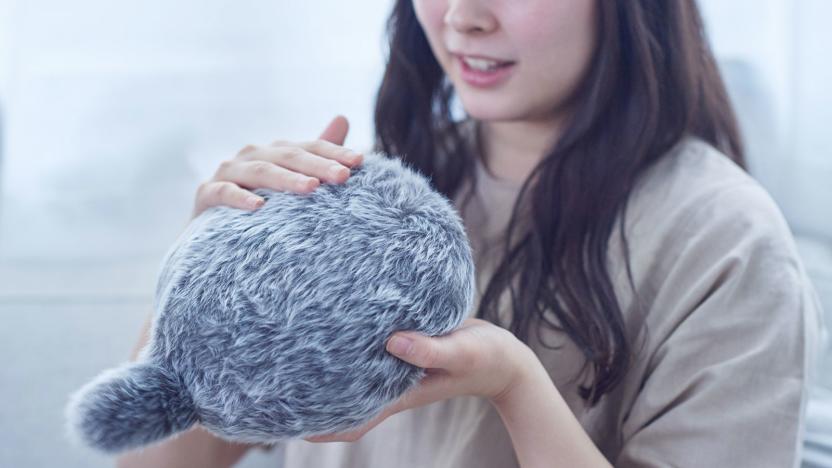
The Petit Qoobo robotic cat tail pillow is available to pre-order on July 30th
Back in January, we got to meet a smaller, more portable version of the Qoobo cat tail pillow, which is aptly named Petit Qoobo. Today, Yukai Engineering announced that it will be using Indiegogo to take international pre-orders for the Petit Qoobo. Meanwhile, the regular Qoobo with a more realistic cat tail will also be available for $135 instead of the usual $149, in case you want to bring both cat tail cushions home.

As 'League of Legends' summer games begin, the pros talk player health
"I hope other people are not ashamed to see a therapist," Søren “Bjergsen" Bjerg said.

How to see a therapist when you’re stuck indoors
While the coronavirus outbreak isn't the first time the world has suffered a global pandemic, we've never been as technologically equipped to take on the challenges of avoiding human contact as now. But as we hunker down and stay home to help prevent the spread of COVID-19, we're all becoming more isolated than before.

Looxid adapts its VR brain monitor for Oculus Rift S
Two years ago, Looxid Labs walked Engadget through a VR museum. A virtual display was pinned to the corner of the user's field of vision and contained real-time stats on his brain activity. At the time, the product seemed a little out-there, but it has matured considerably, and has some clear applications not just in the world of VR gaming, but also in business and health industries. The company revealed that the Looxid Link now works with Oculus Rift S using an EEG-equipped attachment -- and for an add-on, it looks surprisingly slick.

Using Lego therapy for autism
There is no cure for autism spectrum disorder (ASD), which affects one out of every 59 children in the United States. One of its most common effects is difficulty with social interaction and everything it entails, like living independently and holding down a job. Children on the spectrum may avoid eye contact, have difficulty reading people's emotions via nonverbal signals and struggle to express their own emotions verbally.

Google bans ads for unproven medical treatments
In an attempt to remain trustworthy, Google will no longer allow ads for "unproven or experimental medical techniques." Under the new Healthcare and medicines policy, the company will prohibit advertising for treatments that lack biomedical or scientific basis, including most stem cell therapies and gene therapy. That should cut down on ads for things like young blood transfusions and vampire facials.

Xbox Adaptive Controllers will be used for veteran therapy
The Xbox Adaptive Controller might just become an important tool for some US military veterans. Microsoft and the Department of Veterans Affairs have formed a partnership that will donate controllers, consoles, games and adaptive gear to 22 Veterans Affairs rehabilitation centers across the US. The accessible gamepads will help with rehab and therapy activities focused on hand-eye coordination and muscle activation, and should help veterans both have fun and socialize.
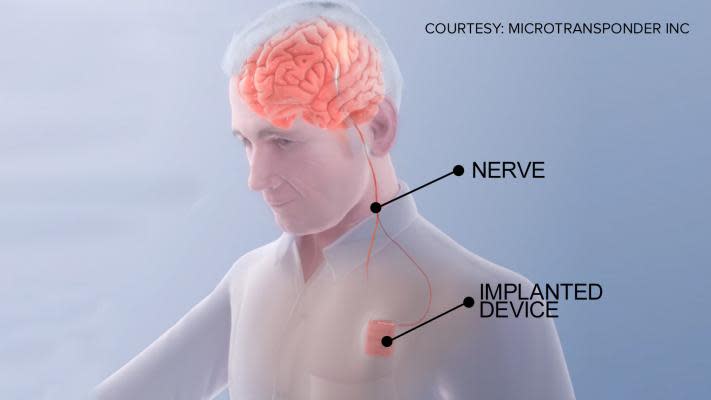
‘Brain pacemaker’ could help stroke patients recover quicker
Vagus nerve stimulation (VNS) may play a beneficial role in the motor recovery of stroke patients, new clinical trials at The Ohio State University Wexner Medical Center have revealed. As part of the therapy, stroke rehab specialists surgically implant the MicroTransponder Vivistim -- an electrical device that stimulates the vagus nerve -- into the patient's chest wall. It works via a wireless transmitter, which picks up signals, redirects them to the vagus nerve (located in the neck) and stimulates the brain whenever a therapist pushes a button.
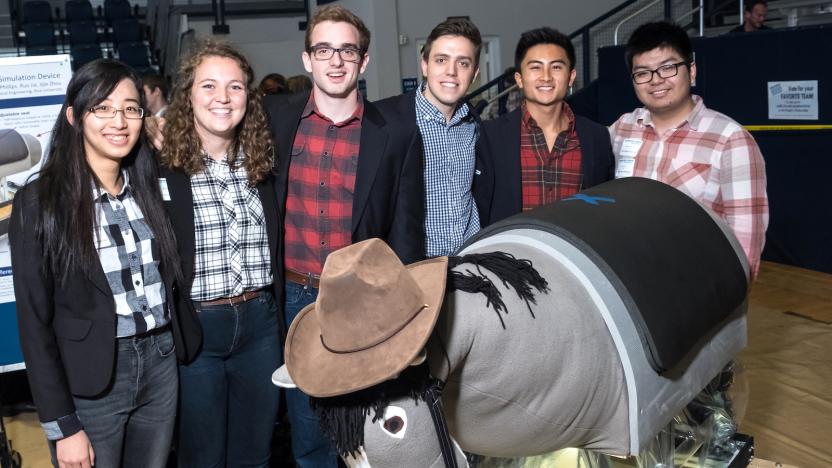
Students make hippotherapy more accessible with robotic horse
Mechanical engineering students at Rice University have designed a robotic horse that can mimic the movements of the real thing. The device, dubbed Stewie, is geared towards individuals requiring equine-assisted therapy, also known as hippotherapy, who may not be able to travel to or afford a facility that offers it. Hippotherapy is believed to be able to help patients develop coordination, balance and posture while also fostering a relaxed state during which other beneficial therapies can be administered. And Stewie could provide a way for more people to benefit from hippotherapy.

Looxid Labs' brain-monitoring VR headset could be invaluable for therapy
Taking in imaginary worlds or a gripping immersive video via VR can elicit strong reactions, and a startup called Looxid Labs wants to know how your brain reacts to all of it. To that end, it built the unimaginatively named LooxidVR system, a phone-based VR headset that packs two eye-tracking cameras and six EEG brain wave sensors.

Sometimes, all you need in life is a cat tail cushion
You may not instantly recognize the name "Yukai Engineering," but you may have already come across its earlier products like the Necomimi brainwave cat ears or the Bocco "family robot" at some point. At CEATEC, the Japanese company unveiled its latest wacky product, the Qoobo "tail therapy" robot. This is essentially a cushion with a realistic cat tail that reacts to stroking and patting, such that it's able to comfort its "owner" like a real pet would simply through tail wagging. To make it more lifelike, Qoobo also wags its tail randomly when it is left alone for too long.

Researchers are looking into how to use cryotherapy safely
Cryotherapy, not to be confused with cryogenics, involves short-term exposure to sub-zero temperatures, and is used by athletes to reduce pain, improve recovery time, and sometimes in itself for pain relief therapy with non-athletes like the rest of us. There are risks: skin and blood vessels that are hit with temperatures of 50 degrees Fahrenheit or below can often suffer nerve and tissue damage,according to the University of Texas, which is now looking into the benefits and problems associated with the therapy.

Light therapy now treats even the deepest cancer
Light therapy is a safe, easy way to kill cancer and treat other diseases, but it's normally limited by its nature to illnesses that are skin-deep. Washington University researchers aren't daunted, however. They've developed a phototherapy method that brings light directly to tumor cells, no matter how deep they are. The technique has you ingesting sugar combined with radioactive fluorine and light-sensitive, cancer-fighting nanoparticles. When you go through a PET scan, the sugar lights up and promptly kicks the nanoparticles into high gear. Effectively, this is a Trojan horse -- since tumors eagerly absorb sugar, they're sowing the seeds of their own demise.
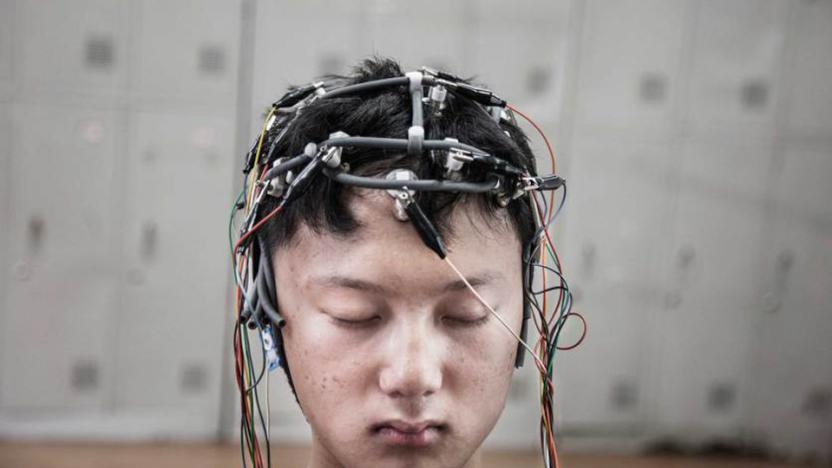
The Big Picture: Monitoring the brains of online game addicts
Online game addiction is a real problem, and some countries are willing to take drastic measures to get these players living a healthier lifestyle. Need proof? Just look up. Photographer Fernando Moleres recently visited an internet gaming rehab camp in Beijing, and saw the facility monitoring the brain activity of addicts using the elaborate device you see above -- the camp wants to see that your mind is changing. The facility also relies on a mixture of medicine, military social structure and psychotherapy to set patients straight. It's hard to know if these "tough love" measures are truly effective, but their very existence reveals just how widespread compulsive gaming has become.

Philips' new LED light strap lets you treat skin disease at home
A skin disease like psoriasis is bad enough by itself, but it's made worse by the frequent need to visit your physician just to alleviate the pain and all-too-visible symptoms. Thankfully, Philips has just unveiled a wearable device that will let most psoriasis sufferers treat themselves. Its new BlueControl strap uses its namesake blue LED lights to slow down cell division (and thus painful inflammation) on your arms and legs; in tests, it cut the severity of symptoms in half without any side effects. The light therapy equipment will require a prescription when it reaches Germany, the Netherlands and the UK this October, but it will likely be worth the effort if it helps you avoid the doctor's office and get on with your life.

Therapists are turning to the web to help revolutionize mental health treatments
We all know how effective the talking cure can be, but for many people, carving the time out of their schedule to meet a psychotherapist can be impossible, not to mention daunting. Services like Pretty Padded Room have sprung up to provide a solution to these problems, offering secure video chats with mental health professionals as an on-demand service. In a report by NPR, a 24-year-old entrepreneur reveals that, rather than the confrontational setting we imagine, a spot of online therapy is more akin to "Skyping with a friend."

This motion controlled dog wants to be the Candy Crush of physical therapy
Physical therapy isn't fun. It's a physical and emotional challenge that often consists of dull, repetitive tasks. It's boring, and offers patients almost no short-term rewards for their very real efforts -- but maybe it doesn't have to be that way. A new software platform called Visual Touch Therapy is trying to make physical rehabilitation fun, gamifying repetitive exercises by marrying a Leap Motion controller, a PC and a simple meme-inspired video game. The game itself is fairly simple: players perform simple motions over the Leap controller that cause a dog character to run (or fly a jetpack) across the screen, and their performance and improvement can be tracked, quantified and even sent to their physical therapist for review.

Newcastle University neuroscientists use video game for stroke rehab
Video games aren't neuroscience, unless they're helping stroke victims recover physical function in a scientific, medical capacity: then they're totally neuroscience. The above video shows off Circus Challenge, an action game from Newcastle University and Limbs Alive Ltd designed to help stroke patients regain motor control of their weakened hands and arms.Circus Challenge uses "next-gen" motion controllers – not the Wii, as other rehab systems have – to have patients fling pies at clowns, juggle, dive and perform other Big Top-inspired feats, with the difficulty progressing as motor skills improve. Newcastle received £1.5 million from the Health Innovation Challenge Fund for its project, and hopes to use the funds to provide remotely monitored, at-home therapy for stroke patients.Aside from all the philanthropy and innovation in the Circus Challenge project, we think the game design is pretty pretty as well. Check it out for yourself up top.












